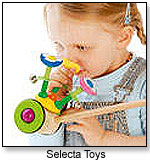
November 21, 2024


| “I’ve had two employees in my back office part time for the last week and a half trying to bring our website into compliance.” — Janet Gregory, Over the Rainbow |
 “It’s an extremely inconvenient time,” said Janet Gregory, owner of Over the Rainbow Toy Store in Anchorage, Alaska, in early December. “I’ve had two employees in my back office part time for the last week and a half trying to bring our website into compliance so I can keep it up for the holidays. And this time of year, more than any, I need all of my staff on the floor with my customers.”
“It’s an extremely inconvenient time,” said Janet Gregory, owner of Over the Rainbow Toy Store in Anchorage, Alaska, in early December. “I’ve had two employees in my back office part time for the last week and a half trying to bring our website into compliance so I can keep it up for the holidays. And this time of year, more than any, I need all of my staff on the floor with my customers.”  Kreisman expressed concern about the new law’s failure to identify the major differences between products being manufactured in the millions and products being made in the hundreds domestically. “Home-based, hand-made types of companies are going to have no way to meet the new requirements. As things evolve, I think retailers and, as a result, consumers, are going to have a lot less [sic] companies to choose from.”
Kreisman expressed concern about the new law’s failure to identify the major differences between products being manufactured in the millions and products being made in the hundreds domestically. “Home-based, hand-made types of companies are going to have no way to meet the new requirements. As things evolve, I think retailers and, as a result, consumers, are going to have a lot less [sic] companies to choose from.”
Copyright © 2024 TDmonthly®, a division of TOYDIRECTORY.com®,
Inc.